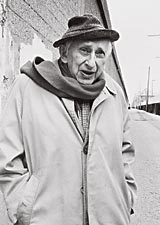|
A
fter leading me into the living room of his two-story brick house in Uptown on a recent afternoon, Studs Terkel raised his arms triumphantly and performed some high-stepping Zorba the Greek dance moves. At 93, this Chicago icon-former soap opera villain, improvisational TV star, WFMT Radio host, and award-winning author-has a lot going on, and I had stopped by for an update, bearing a fifth of Glenlivet. (Switching from gin to Scotch, I had been told, was one concession that Terkel has made to aging.)
In April, The New Press will reissue Terkel’s first oral history, Division Street: America, originally published in 1967 to stellar reviews. On May 16th, having in the past year survived a broken neck from a fall and a heart valve replacement, Terkel will celebrate his 94th birthday. He is now at work on a memoir, Touch and Go; his first, Talking to Myself, was published in 1973.
Late last year, when doctors discovered that Terkel’s valve was on the blink, he was told that he had four months to live. “I said, ‘Well, that’s enough anyway,'” he recalls. “Finally, I said, ‘OK, let’s do [the operation]-it was my ego, my curiosity.'” (Terkel’s father and two brothers died in their 50s of angina, so he is a genetic fluke.)
Repairs accomplished, he remains a full-throttle life force.
“This will be a digressive interview,” he warns, and then he sets off on the idea of longevity and survival, looping through subjects and centuries: Hiroshima and Nagasaki, Tito Gobbi, Puccini, J. Edgar Hoover, Albert Einstein, Mel Brooks, Enrico Fermi, J. Robert Oppenheimer, Franklin D. Roosevelt, Shakespeare, Mozart.
Terkel seems to remember everything that he has seen, heard, and read. But on a grand scale, he believes, limitations loom large. “We are suffering from something I call a national Alzheimer’s disease; we the country, maybe the world,” he says. “There is no yesterday.”
When it comes to issues such as class and race, however, the present has a startling resemblance to the past. That is why Division Street is being reissued, this time with an introduction by Alex Kotlowitz. “The title is a metaphor,” Terkel explains. “We are divided, and never has it been truer than it is now.”
He included 71 interviews in the book, “with people who are anonymous, who make the world go around,” he explains. “The waitress, the cabdriver, the tool and die maker, the schoolteacher.” This approach works because on an individual level, Terkel has great faith in human nature. “There is a basic decency in people,” he says, “and there is a basic native intelligence in people.”
Over the years, some of Division Street‘s subjects have died, but with Terkel they have not been forgotten. When he can’t sleep, he doesn’t count sheep; he runs through the names of people he has known who are no longer alive. The biggest loss, in 1999, was that of his wife, Ida-warm-hearted, with the grace of a ballerina, and fiercely devoted to fairness.
At this point, Terkel is untroubled by thoughts of his own mortality. “If I died in my sleep tonight,” he says, “I wouldn’t feel too bad about it.”
But he does have that memoir to finish. “A 94-year-old guy is telling a story,” Terkel explains. “It’s going to be full of digressions, but the digression has a lot of continuity to it.” By now it is late afternoon, and thinking of the Glenlivet, that liquid amber balm, Terkel leans back and says, “Let’s have a little touch.”
Photograph: Jerome de Perlinghi



